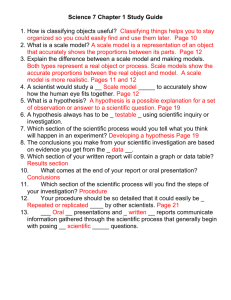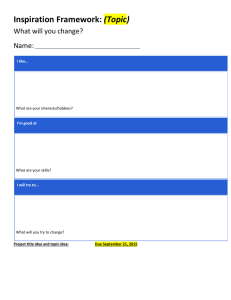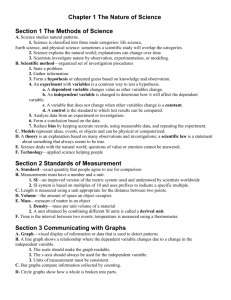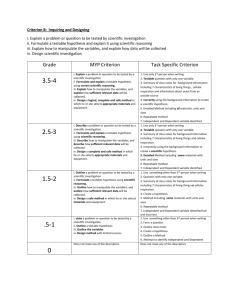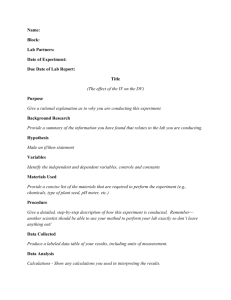What makes a successful EPQ Title?
advertisement
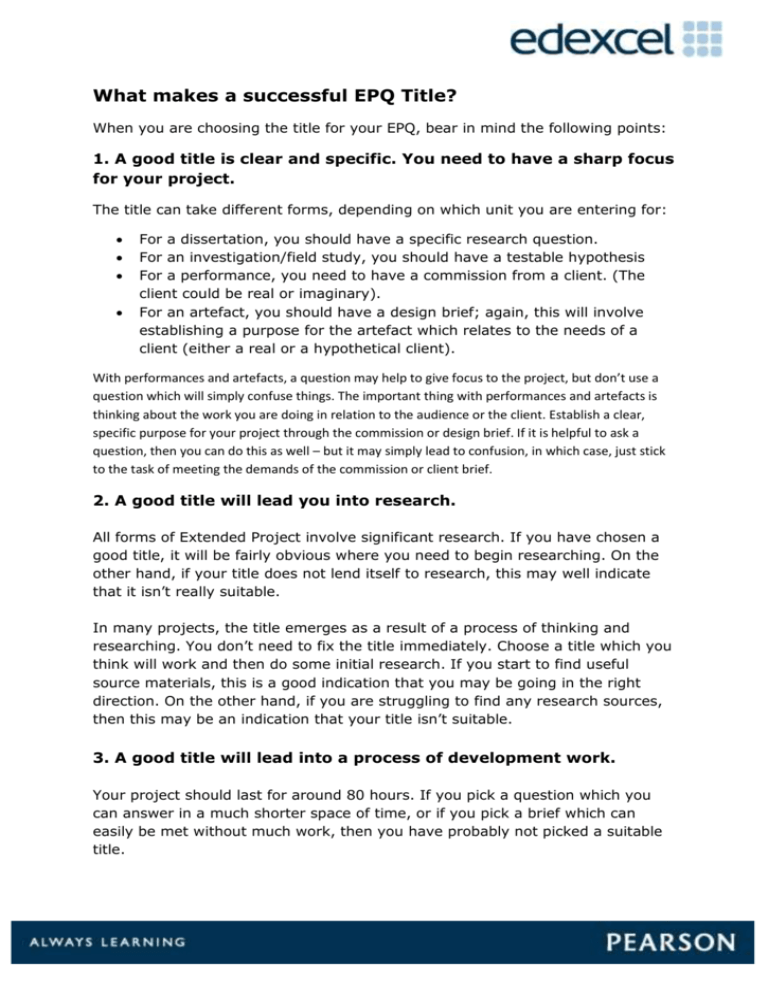
What makes a successful EPQ Title? When you are choosing the title for your EPQ, bear in mind the following points: 1. A good title is clear and specific. You need to have a sharp focus for your project. The title can take different forms, depending on which unit you are entering for: For a dissertation, you should have a specific research question. For an investigation/field study, you should have a testable hypothesis For a performance, you need to have a commission from a client. (The client could be real or imaginary). For an artefact, you should have a design brief; again, this will involve establishing a purpose for the artefact which relates to the needs of a client (either a real or a hypothetical client). With performances and artefacts, a question may help to give focus to the project, but don’t use a question which will simply confuse things. The important thing with performances and artefacts is thinking about the work you are doing in relation to the audience or the client. Establish a clear, specific purpose for your project through the commission or design brief. If it is helpful to ask a question, then you can do this as well – but it may simply lead to confusion, in which case, just stick to the task of meeting the demands of the commission or client brief. 2. A good title will lead you into research. All forms of Extended Project involve significant research. If you have chosen a good title, it will be fairly obvious where you need to begin researching. On the other hand, if your title does not lend itself to research, this may well indicate that it isn’t really suitable. In many projects, the title emerges as a result of a process of thinking and researching. You don’t need to fix the title immediately. Choose a title which you think will work and then do some initial research. If you start to find useful source materials, this is a good indication that you may be going in the right direction. On the other hand, if you are struggling to find any research sources, then this may be an indication that your title isn’t suitable. 3. A good title will lead into a process of development work. Your project should last for around 80 hours. If you pick a question which you can answer in a much shorter space of time, or if you pick a brief which can easily be met without much work, then you have probably not picked a suitable title. For written projects, there should be substantial development of argument. You should pick an open question: one that can be answered in different ways. Don’t pick a closed question which can be answered just by finding out the right pieces of information. There needs to be something to argue about. In your project, you will be researching different answers, analyzing them, and arguing about which answer you think is best. This will mean looking at arguments and counter-arguments, or, in the case of an investigation/ field study, different interpretations of the data. For performance or artefact projects, make sure that there are alternative possible developmental routes. If you have chosen a suitable title, there should be different ways of designing or creating your project outcome. Then in your project, you will be able to explore these alternatives and evaluate them critically. 4. A good project title will lead to a set of objectives which can be evaluated. Once you have decided on a potential title, think about the specific objectives for your project. The objectives are the tasks you need to complete in order to answer your question, test your hypothesis, or fulfil the commission or brief for your work. Normally there will be a few objectives. Think of them as the stages on the journey to the completion of your project. Bear in mind that one of the final stages in your project is the review stage. This is where you evaluate the extent to which you have achieved your objectives. It is important, then, that you have clearly defined objectives – otherwise it will be difficult to evaluate the extent to which your project has succeeded. 5. A good project title is at the right level Remember that the Extended Project Qualification is a Level 3 Qualification. This means that the level of work should be comparable to the work done for an A level. It is worth bearing this in mind when choosing the initial question, brief, commission or hypothesis. If the level of material and ideas you are working with is lower than A level standard, it will be difficult to access the full range of available marks. 6. A good project title will involve extending yourself beyond your other areas of study. As the name suggests, the ‘Extended Project’ is all about stretching yourself. The project you produce should not be the same as one that could be submitted for a different qualification. For example, it should not be just like an Art and Design project, an English essay, or a piece of History coursework. You need to show that you have done something different. This can happen in a number of ways: You can teach yourself a new skill. If you are doing a practical project, you may want to learn a new technique, work with new materials or work in a new medium. You can explore a topic from a number of different points of view. The Extended Project provides a great opportunity for cross-curricular study. Keep a specific question in mind, but explore it using ideas and methods drawn from different subjects. You could, for example, explore the ethics and science associated with the topic of human cloning, or animal welfare issues. You could look at the history, economics and politics of the European Union. You could look at the philosophy and psychology of mental illness, and so on. You could explore a topic which does fit within a single subject of study, but analyze it in much greater depth. Suppose that you are an A level history student, and you have studied the topic of the causes of the First World War. You could use this as the starting point for an Extended Project by looking in greater depth at the concept of historical causation, and examining what it means to talk about ‘the cause’ of an historical event. In a project like this, you could use your knowledge of a particular historic event, such as World War One, as a case study which helps to give focus to an exploration of the deeper question of historical causation. Example P301 Dissertation Titles “How do rockets work?” This is in the form of a question, and it would lead to research. However, the answer to this question is known. There is not much here to argue about, and this project will tend therefore to be descriptive, and not involve much development of argument and counter-argument. It would be better to compare two proposals for new rocket technology, where there would be scope for evaluating which is best. “What qualifications do I need to be an occupational therapist?” This is a closed question. The answer can be found quite easily through research. So there will be nothing to argue about. It is also not suitable because it can be answered quite easily; it will not take around 80 hours of work to establish the answer. It would be better to carry out a project in which the idea of occupational therapy is analyzed, with an evaluation of the relative merits of entering this profession by different career routes. “Do violent video games encourage violent behaviour?” This is a question which can be researched and there are different possible answers which can be argued about. However, it is a deceptive question. It is easy to explore by looking at some examples which have been reported in the media, or by looking at the content of the games themselves. But on its own, this research will not really enable you to answer the question. To really get to grips with this question, it will be necessary to look at scientific research papers, where carefully constructed trials have been carried out. Interpreting this research is a complex task. This could be done as an Extended Project (and this question could well be turned into an investigation/field study, if there was some primary research) but it is important to be aware of the complexity of the issue. This is not a good question for a student who is really only interested in video games. “How does illegal downloading of music affect the record industry?” This question needs to be made sharper. There are lots of possible effects which could be explored here, and there is a danger that the project will simply end up describing them, and not analyzing the issue. A question such as ‘Are fines an effective deterrent to illegal down-loading?’ would be more focussed, and would allow scope for evaluation as well as description (does the evidence show that fining down-loaders does deter them? Are there alternative ways of dealing with the problem, and do they work better?) “Should smokers be treated on the NHS?” This is a promising question, with potential for research and argumentative development. To develop this project, it would be necessary to look at the NHS guidelines on treatment, and to look at some of the academic arguments for and against basing treatment decisions on behavioural conditions. “Is there life on other planets?” This question allows scope for both research and consideration of arguments for and against a particular answer. There would be a lot of scientific ground to be covered here, and it may well be that once the research process is underway, the student might prefer to narrow the question down. A more specific question, for example, would be: ‘How much difference has the discovery of exo-planets made to the probability of there being life on other planets?’ “Caring for my horse” As it stands, this is not a suitable title for a research dissertation. It is not in the form of a question, and there is no clearly defined issue to be researched and analyzed, (Nor is there much here to be argued about). It would be better to identify some specific elements of equine management which could be evaluated, perhaps by means of a contrast of the merits of two different programmes. “Are some adverts unethical?” This question would naturally lead to research and analysis, so it is a promising starting point. It addresses an area of controversy, so there will be scope for argument and counter-argument. As with other topics, as well as looking at specific case studies, the project should involve exploration of the regulatory framework around the advertising industry (e.g. looking at the work of the ASA). The question as it stands is quite broad in scope and it would be better if it could be narrowed down. Focusing on advertisements targeted at children would be an obvious direction to take this project. Example P302 Investigation / Field Study Titles “Is there an age group when social networking is most prolific?” This is a promising title. It is focused and clear, and it would be easy to formulate a testable hypothesis following some initial research. It would also be possible to carry out primary research and compare the findings of this with published data from secondary sources. “At what age can children interpret emotions from images?” This title needs to be a little clearer if it is to serve as the basis for an investigation with a testable hypothesis. The terms ‘emotion’ and ‘image’ are broad in scope. The project could be focussed by, for example, looking at the ability of children to recognize expressions of emotion in people’s faces. This would be quite a challenging field to explore, and it would be best to begin with a literature review of secondary research sources, which will indicate what research methods can be used to carry out an investigation like this. These methods could then be adapted and used to gather some primary data. “How has marina development affected local marshland biodiversity?” This is an interesting and quite well-focused title. As it stands, it is still a little broad and some narrowing down would be needed as the project gets underway. There are various aspects of development which could be explored and it would be necessary as well to carry out research to find the appropriate techniques for measuring biodiversity. “Effect of leading questions on witness?” There is an interesting issue here but as it stands, this is not a suitable title. There needs to be a research question which is linked to a testable hypothesis. The term ‘leading question’ would need to be defined in a measurable way. Provided that there was access to suitable data, it should be possible to explore this issue in an investigation, but some initial research would be needed to help refine this title into a specific question. “How is pepper heat related to colour?” This title is based on the thought that there might be a correlation between the colour of a pepper and the heat it seems to produce in the mouth. Once a technique for measuring subjective sensations of heat has been established (e.g. the Scoville Test), this question will yield a testable hypothesis and is thus suitable as an investigation title. “Monitoring an fitness programme for improving hurdling performance” This is a suitable topic for investigation but some work needs to be done to generate a hypothesis. A fitness programme will consist of a variety of elements, and each of these will need to be used to generate data which can be analysed and used in testing a hypothesis, or set of hypotheses, about which factors will affect hurdling performance, and to what extent they will be significant. Example P303 Performance Titles "Can I perform a story through aerial work and communicate the narrative effectively to an audience?" This question has the potential to lead to a successful project but it is slightly forced. It would be better to express the title in the form of a commission rather than a question. So, for example, the project title could be: ‘Use aerial performance work to communicate a narrative effectively to an audience’. This could also be made more focused by specifying the nature of the audience and the narrative. "Rugby League and Rugby Union - a presentation to sports students." As it stands, this title is less likely to lead to an effective project. The focus is on the presentation of facts. Without further consideration of performance issues, such as which performance techniques and skills will be used, what form of presentation will be most effective given the audience, and how the work can be crafted and refined through a process of rehearsal, with consideration of design alternatives, the title will constrain the student’s capacity to access the full range of marks. "Create a skit to be performed to a community audience that advocates the role of education as a long term economic driver and tool for change." This is a clear and well-formed performance title. There is identification of the target audience (this could be developed in the planning stage, with explanation of the nature of the community), and the purpose which the performance is designed to achieve is also specified. Although not mentioned, it would be easy to infer that this was work which had been commissioned by a client. "Can dance communicate what it is like to live in an eastern culture?" This title has the potential to lead to a successful project but more focus needs to be achieved. It is quite broad in scope and so it is not clear what aspects of ‘Eastern culture’ will be portrayed (nor what counts as ‘Eastern’). It is also not clear what alternatives will be considered: is the contrast between dance and some other mode of performing, or between different dance styles? It will help if the student considers these issues before progressing too far with the work of rehearsing and performing. "Beethoven and his life. A performance presentation to show how his compositions and letters inspire my piano playing." This title lacks either a question or a commission to give focus and direction to the process of creating the performance. The aim of the performance needs to be considered in relation to an audience. Example P304 Artefact Titles “How do you design and make a brochure about shipping?” This project title would work better as a design brief, as there would then be more of a focus on key design issues, such as the purpose for which the brochure is needed, what sort of brochure will be produced, by what techniques, from what materials, and using which specific design processes. For a successful artefact, design and construction issues should be to the fore, so it would be important here that there is some application of suitable technical skill in the working of designing and creating the brochure. A project in which most of the work went into selecting text and images, and which neglected key design considerations, would be less successful. “To learn new woodworking techniques” This is not, as it stands, a complete title for a project. It is more like an objective which could be realized during the course of a project, the aims of which are not yet determined. So, for example, suppose that a student decided to make a children’s toy; this could be part of the overall aim of the project, and then it might be appropriate to learn to use new woodworking techniques in order to achieve this aim. “Design a prom dress” This is a suitable title, insofar as it specifies a particular item for a particular purpose. It does not yet set many constraints on the design, and this would need further consideration. What materials will be used? What processes will be followed and what techniques will be applied? The answer to these questions depends on the interests and needs of the client, so it would help here if this was described some more during the opening phase of project work, perhaps as part of a written design brief. “Recycling: animated shorts” This title gives a general indication of what the overall aim of the project is. More detail would be helpful here. In particular, it is important to consider the nature of the client brief. Who has commissioned this work? For what purpose is it needed? Who is the target audience? What constraints are there, in terms of media, materials and design processes? At the moment, the theme of the work is clear but these other design considerations remain to be determined. “Design and create a DVD of a free-running challenge” This title gives an overall indication of the aim of the project. It is not yet clear what exactly is going to be done during the process, though. Is the student going to be filming, acting, producing or creating artwork for the packaging? Depending on the nature of the creative role, decisions will then have to be made about what is appropriate in terms of design. Again, consideration of the client’s needs and the target audience will be important, and there should be careful thought about production techniques, with consideration of style, genre, story-boarding, camera-work etc.
